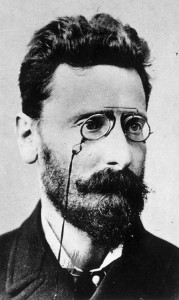2018 Pulitzer Prizes
April 18, 2018
The winners of the 102nd Pulitzer Prizes were announced on Monday, April 16, by Columbia University on the recommendation of the Pulitzer Prize Board. The awards are given in the United States each year for distinguished achievement in journalism, literature, drama, and music.

Joseph Pulitzer, a Hungarian immigrant, became one of the greatest American newspaper publishers in history. He established the Pulitzer Prizes for achievements in journalism, literature, music, and art. Credit: © Hulton Archives/Getty Images
The public service prize in 2018 went jointly to the The New York Times and The New Yorker magazine for exposing sexual harassment in Hollywood and spurring global debate on the sexual abuse of women. The staff of the The Press Democrat (Santa Rosa, California) won the breaking-news reporting prize for its coverage of wildfires that ravaged the city of Santa Rosa and Sonoma County. The prize for investigative reporting went to the staff of The Washington Post for revealing alleged past sexual harassment of teenage girls that changed the course of a U.S. Senate race in Alabama.
The staffs of The Arizona Republic and USA Today Network won the explanatory-reporting prize for detailing the difficulties and consequences of constructing a wall along the U.S. border with Mexico. The staff of The Cincinnati Enquirer won the local-reporting prize for documenting greater Cincinnati’s deadly heroin epidemic. The staffs of The New York Times and The Washington Post shared the national-reporting prize for coverage of Russian interference in the 2016 presidential election and its connections to the U.S. presidential campaign of Donald Trump. Reuters reporters Clare Baldwin, Andrew R.C. Marshall, and Manuel Mogato won the international-reporting prize for exposing the killing campaign behind Philippines President Rodrigo Duterte’s war on drugs. Freelance reporter Rachel Kaadzi Ghansah won the feature-writing prize for her GQ magazine portrait of Charleston, South Carolina, church killer Dylann Roof.
John Archibald of the Alabama Media Group won the commentary award for scrutinizing corrupt local politicians, championing the rights of women, and calling out hypocrisy. Jerry Saltz of New York magazine won for visual arts criticism. Andie Dominick of The Des Moines Register (Iowa) won for editorial writing. Freelancers Jake Halpern and Michael Sloan won for their editorial cartoons in The New York Times. Ryan Kelly of The Daily Progress (Charlottesville, Virginia) won the breaking-news photography award for capturing on film a car attack during a racially-charged protest in Charlottesville. The Reuters photography staff’s documentation of violence against Rohingya people in Myanmar won the award for feature photography.
Andrew Sean Greer won the fiction-writing award for Less, a story about growing older and the essential nature of love. Martyna Majok won the drama prize for examining diverse perceptions of privilege and human connection in Cost of Living. Jack E. Davis won the history award for The Gulf: The Making of an American Sea. Hisham Matar won the biography or autobiography award for Prairie Fires: The American Dreams of Laura Ingalls Wilder. Frank Bidart won the poetry prize for Half-light: Collected Poems 1965-2016. James Forman, Jr., won the nonfiction prize for Locking Up Our Own: Crime and Punishment in Black America. Rapper Kendrick Lamar’s album DAMN. became the first nonclassical or jazz work to win the Pulitzer Prize in music.
The Columbia University School of Journalism was founded in 1912, and the first Pulitzer Prizes were awarded in 1917. Joseph Pulitzer, a newspaper publisher who founded the St. Louis Post-Dispatch, established the prizes. Nearly all of the Pulitzer Prizes have a value of $10,000. The only exception is the prize for public service in journalism. The winner of that award receives a gold medal.


